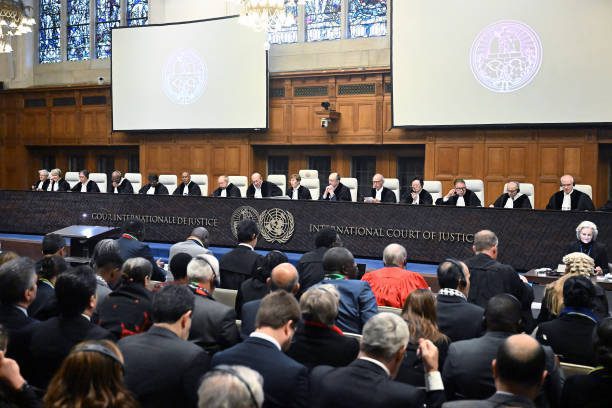The top United Nations court, on Friday, issued a historic directive demanding Israel to cease military activities in Rafah “immediately”. This ruling is poised to intensify the mounting international pressure on Israel, more than seven months into the Gaza conflict.
The International Court of Justice (ICJ) also mandated that Israel keep the critical Rafah crossing open to ensure “unhindered” humanitarian aid and called for the “unconditional” release of hostages taken by Hamas during their October 7 assault.
ICJ rulings hold legal authority but lack concrete enforcement mechanisms. For instance, the court previously ordered Russia to halt its invasion of Ukraine, without success.
The ICJ stated Israel must “immediately halt its military offensive, and any other action in the Rafah Governorate, which may inflict on the Palestinian group in Gaza conditions of life that could bring about its physical destruction in whole or in part.”
Israel contended that ceasing military activities would grant Hamas extremists free rein and obstruct the rescue of hostages taken during the group’s brutal October 7 attack.
Prime Minister Benjamin Netanyahu announced plans to convene senior ministers following the ruling.
South Africa praised the decision, with Foreign Minister Naledi Pandor describing it as a “much stronger… set of provisional measures, very clear call for a cessation.”
The ICJ’s ruling follows another significant decision on Monday by the International Criminal Court (ICC) prosecutor to seek arrest warrants for senior Israeli and Hamas leaders. Prosecutor Karim Khan accused high-ranking Israeli leaders, including Prime Minister Benjamin Netanyahu, and top Hamas officials of war crimes and crimes against humanity related to the Gaza conflict and the October 7 attack.
‘Obscene Exploitation’
South Africa initiated the ICJ case last year, accusing Israel’s Gaza offensive of violating the 1948 UN Genocide Convention—a charge Israel vehemently denies.
In a January 26 ruling that garnered global attention, the ICJ ordered Israel to prevent acts of genocide during its military operations in Gaza. On Friday, the court reiterated this directive, ordering Israel to ensure “unimpeded access” to UN-mandated investigators examining genocide allegations.
However, South Africa has repeatedly returned to the ICJ, arguing that the worsening humanitarian crisis in Gaza necessitates further emergency measures.
During recent public hearings, South Africa’s ambassador, Vusimuzi Madonsela, claimed, “Israel’s genocide has continued apace and has just reached a new and horrific stage.”
“Although the present application was triggered by the unfolding situation in Rafah, Israel’s genocidal onslaught across Gaza has intensified over the past few days, also warranting the attention of this court,” he added.
South Africa argued that halting Israel’s military operations was essential to facilitate humanitarian aid to alleviate Gaza’s crisis.
The court, while deliberating on the broader genocide case, can issue urgent measures, a process that may take months or years.
The ICJ described the humanitarian situation as “disastrous” and criticized Israel’s evacuation efforts as insufficient.
Israel countered, labeling South Africa’s case an “obscene exploitation of the most sacred convention” and argued that the depiction provided to the court was “completely divorced from the facts and circumstances.”
“It makes a mockery of the heinous charge of genocide,” stated top Israeli lawyer Gilad Noam during the hearings.
“Calling something a genocide, again and again, does not make it genocide. Repeating a lie does not make it true,” he asserted.
Israel also emphasized its awareness of civilian suffering in Gaza and its “extensive efforts” to increase humanitarian aid.
US President Joe Biden remarked this week that “what’s happening is not genocide.”
Stalled Negotiations
Israel expressed readiness on Thursday to resume stalled negotiations on a truce and hostage release deal with Hamas, as Netanyahu faces increasing domestic pressure to secure their freedom.
US intelligence chief Bill Burns is expected to meet Israeli representatives in Paris to relaunch negotiations, according to a Western source close to the issue.
Previous discussions in Cairo and Doha, mediated by Qatar and Egypt for Hamas, broke down earlier this month.
The Gaza conflict erupted after Hamas’s unprecedented October 7 attack, which led to over 1,170 deaths, primarily civilians, based on an AFP tally of Israeli official figures. Militants also took 252 hostages, with 124 remaining in Gaza, including 37 whom the army believes are dead.
The ICJ reiterated its call for the “immediate and unconditional” release of these hostages.
Israel’s retaliatory offensive has resulted in at least 35,800 deaths in Gaza, mostly civilians, according to the Hamas-run territory’s health ministry.

















